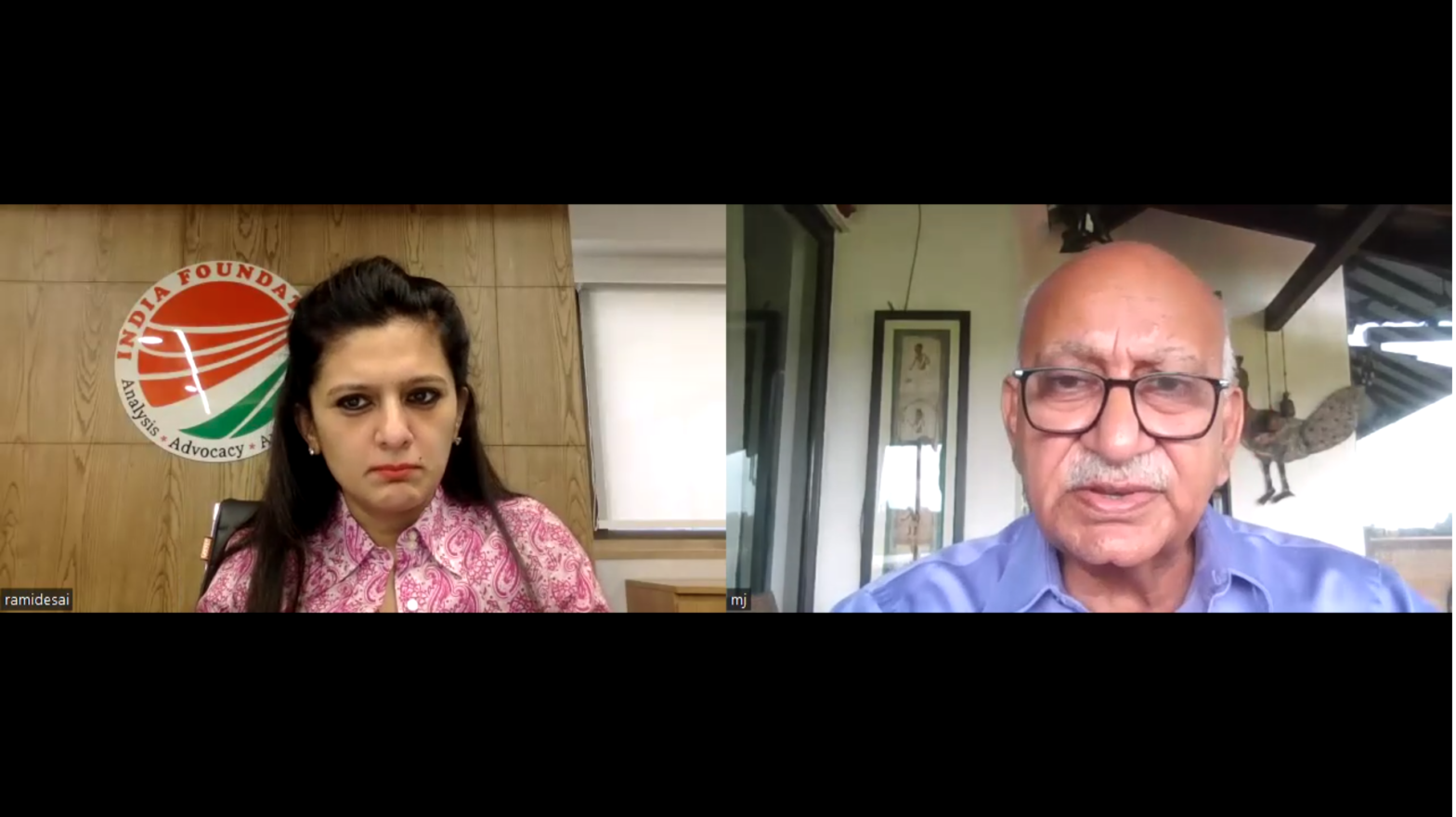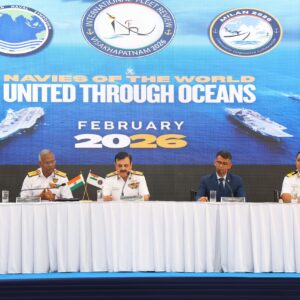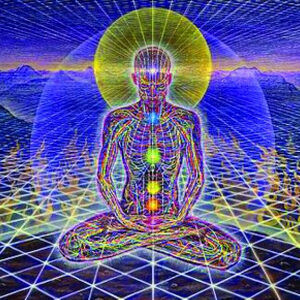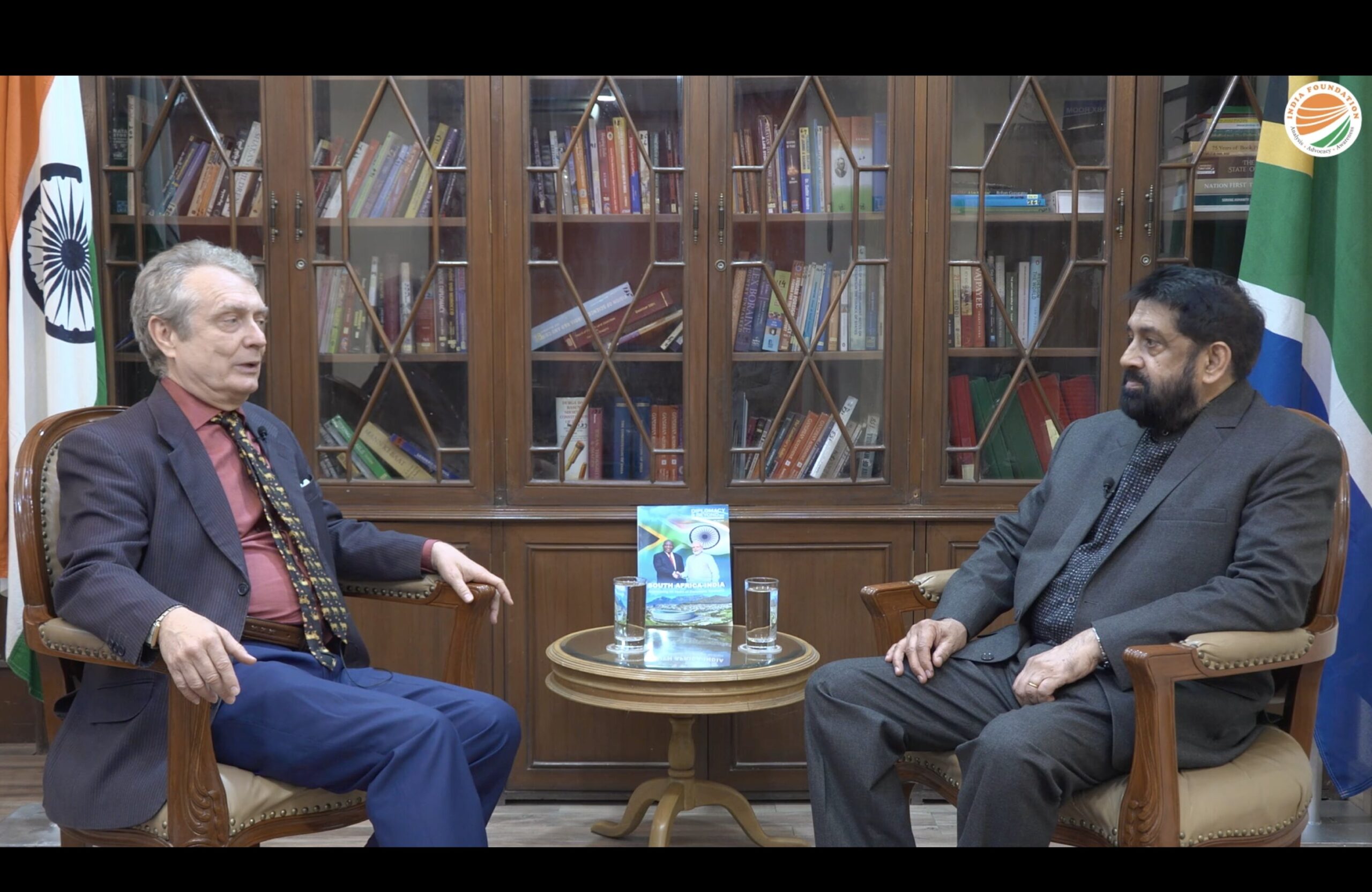Rami Niranjan Desai:
In your journalistic career and also in your role as the Minister of State, External Affairs, Govt of India, you have closely observed India’s relations with the Middle East. While the region has been a priority for India, there is a distinct change now, in India’s dealings with the region. What are the factors that contributed to this change?
You obviously saw the early developments being MOS external affairs on the different relationship building that India, sort of had with the Middle East. Even though the Middle East has been a priority for India, it seems like something changed. Can you take us through what the foreign policy change was and what contributed to this positive relationship that we have with the Middle East today?
MJ Akbar:
Let me start with a question, not an answer, right? What on Earth is the Middle East? I don’t raise it as a semantic question or a kind of peripheral banter; I raise it as a vital element of our understanding of this region. The moment we call it the Middle East, we are not looking at it from the perspective of the region. We are not looking at it from the perspective of Asia or even from the perspective of Africa. We are looking at it from the perspective of the colonial powers, primarily Britain, and then its successor power in the region, America. For them, it is in the middle of their east. If you want to call any region in Asia, the Middle East, then, actually, the only Middle East is India. So first, unless we clear these cobwebs that have been planted upon our brain and into our intellectual DNA by colonialism, we are not going to be able to see reality. Let’s call it West Asia, which is a far better term. It is a term that we have used with great consistency, and I hope that this term will also find genuine currency even in the countries of the region we are addressing.
From the Indian perspective, the most crucial development under Mr. Modi’s prime ministership happened, like most great changes, almost surreptitiously. He redefined the arc of the neighbourhood. He also redefined what a neighbour is—not simply an accident of geography but defined by reach. As an illustration, today, we have, from across India, over a thousand flights to the Gulf every week. And on these flights, it isn’t easy to find a seat!
On the other hand, there is not a single flight to Pakistan. So, who is India’s neighbour? This consciousness that you mustn’t get trapped by geography and that you must rise above geography and see things and create new realities is one of the most significant achievements of Prime Minister Modi, which happened stage by stage, step by step. The starting point was when he became the Prime Minister and visited the UAE, becoming the first prime minister in about 36 years to do so. What was India doing for three and a half decades before that? And even before that, the visits were cursory rather than substantive. Mr Modi has turned it into a substantive relationship. These are all Arab nations, after all. He pulled the Gulf, and Egypt is part of the Gulf. And here again, I’ll offer you a reality that corrects our perspective’s dimensions. It takes less time to reach Dubai from Delhi than it takes to reach Cairo from Dubai. That’s how close we are to the Gulf. And from Mumbai, it is even closer.
That is a change of perspective because Mumbai and Dubai have a vast gulf of water between them. And from there, we went to take the sequence forward, right up to Indonesia. And that’s the arc of the new neighbourhood, which has become one of the most productive elements. It is a very sustained and sustainable relationship, built on the most valuable part of any bilateral or multilateral relationship—the economic welfare benefits to the people. Geopolitically, we broke through a kind of wall constructed between us by a particular neighbour in the name of religion, and this process has been very beneficial to us. From COVID onwards, it began to stutter a little but will revive consciously because the base is too strong. What has been built has already achieved a great deal. And I think we will see a continuation of what has been created for the region’s benefit. Eventually, the world understands that very positive new geopolitics is in play.
Rami Niranjan Desai:
Absolutely. You made some fascinating points. Stability in West Asia is hugely essential for us to continue this engagement. How do you see the conflict between Israel and Hamas playing out. Do you think it will remain limited or in the long run, do you see it becoming a larger issue which can spread to Iran. How do you think India is dealing with it?
MJ Akbar:
A point I missed in my opening remarks was that the most interesting part of Prime Minister Modi’s foreign policy was that this whole bridgehead created with West Asia was not at the expense of our relations with Israel. And it is unique. It is remarkable, and they recognised it. The region accepted India’s outreach because they knew that Prime Minister Modi was not building any relationship that would be hostile to their cause. India is a power. India is a regional power. A regional power has and must have the capability of having relationships across binaries. Regional conflicts do not break our relationships. We have very good relationships with Iran. At that time, Iran was not the closest of friends with the UAE and the Saudis, but we built excellent relations with both and continue to do so. And this has been recognised in the region and is a significant contribution to them and the issue. So, India can create a balance in a challenging region. As far as the conflict goes, let’s score and underscore one fact—flames don’t have a geography.
Just as we speak, Hassan Nasrallah has threatened Cyprus because he says that the IDF—the Israeli Defense Forces, are training in Cyprus for a possible invasion of Lebanon. This war is not going to end so soon. There are many new discordant elements that one hears from within Israel. Recently, the IDF made two important statements. One is that Hamas is not going to be defeated so easily because it is an ideology. It is not simply an army. It’s equivalent: Can you defeat the communist ideology even if you defeat the PLA? So, that’s a very wise position to take. They’re asking for not an end to conflict but a restructuring of war objectives. War objectives are always the most essential elements of war and must be rational. They have to reflect a sense of justice against justified grievance. They cannot become irrational.
Right. And I think these are the difficult questions now bothering the region. Horrific scenes are being played out every day from the Palestinian camps and the tragic death of young people in the Israel Defense Forces—young people on both sides of the conflict. The old never die from the decisions they make. I think India should have a significant role in resolving this crisis.
Rami Niranjan Desai:
You also said there’s no end to this because it’s like an ideology. Hamas is an ideology. Where can India fit in? India also depends on West Asia for its energy requirements. Hence, the stability of this region is hugely important to India. You also said that Prime Minister Modi has navigated in such a way that he enjoys the trust of all parties involved. So what can India do to ensure that there is stability in this region and that its impact on trade and energy flows to India is not hampered?
MJ Akbar:
The trade and energy flows will continue irrespective of the conflict because trade is not one-sided. The energy producers need a market as much as the market needs the energy. So, that is not the top of my concerns. The concerns are really of destruction, where there should be positive construction. What can be created by amity, and I am not even using the term harmony, is far more valuable than what can be achieved by rampant destruction. That’s the lesson of every war because it is essential to remember that we are not in the age of empires. The Age of Empires collapsed with the end of colonialism. I know that neocolonialism has not ended, but colonialism has, and we are in the age of the nation-state. We are in the epoch of the nation-state. While this has not meant the end of war, internationally, there is more rational behaviour. Achieving a sustainable settlement of the region should be the only focus of all powers with a positive and beneficial attitude towards the region. War is no longer going to be fought in compartments. War is now an open battle. It affects everyone and everything. Governments also know this because a few governments are now beyond accountability. People extract a price if their affairs are not managed well. It affects all of us, and it is in the common interest of the rational world to find solutions to the conflicts in the region because I think Israel is also paying a very, very heavy price
Rami Niranjan Desai:
The international credibility of Israel is at an all-time low at this point. Do you think releasing the hostages held by Hamas would lead to a less assertive response from Israel, or do you think that will not change anything?
MJ Akbar:
You can’t clap with one hand. I mean, quid pro quo. That is the basis of all negotiations. There is no one-way offer. It won’t happen however much you may ask for it or however much you may wish for it. Both sides understand it. When we talk of the hostage crisis, why do you forget that a large number of hostages have been released? So, there have been deals before. Why should there not be a deal again? The problem, in my view, is the forces that have a vested interest in continuation of war. I’m not naming them because I don’t think guilt is only on one side.
Rami Niranjan Desai:
How can India play a role if the conflict remains localised and does not explode into something larger?
MJ Akbar:
The only nation that can become a bridge is one with pillars on both sides. India has pillars of goodwill on both sides, so why not India? However, this is a role that the US wants to play and has allotted to itself. But the Americans should also understand that this is an area in which India can help. The US could reach out to us. We do have a very good relationship with the White House, and here I mean a White House, irrespective of who’s the occupant of the White House.
Rami Niranjan Desai:
Correct. But as of now, what has been India’s position in the Israel-Hamas conflict?
MJ Akbar:
We have a position which is also the position of most nations, and that is to find a credible route map to a resolution. Do not treat conflict as an end in itself. What India is saying is in the interest of both sides. That is why it has credibility. India has no vested interest in the conflict but has a very strong vested interest in peace and in conflict resolution. But of course, it would require the acceptance of the US and perhaps Europe for India to find a place in the evolution of this unfortunate tragedy.
Rami Niranjan Desai:
Also in West Asia, one of the things that remains significant apart from what is happening right now is that we all talk about terrorism and it being a global security threat. Do you think India has some sort of leverage to combine its strength with West Asian countries to find some amount of cooperation to combat terrorism effectively?
MJ Akbar:
That fact is now non-negotiable. Terrorism as a weapon has been advertised as the weapon of the weak, and so on. Terrorism, however, is not acceptable, because the world has enough forums and enough space to move forward through the basis of negotiations. I once was asked by the Pakistani High Commissioner to Delhi as to when will there be peace talks. And I told him there will be peace talks when there is peace. You can’t have peace talks, at least in our bilateral situation, when you think that you can ignite terrorism as a form of blackmail. The Indian people are not ready to accept blackmail. So, abandon it. Why don’t you see the history of the last 50 years? There was a region called East Pakistan, which was as Pakistani as West Pakistan. Fifty years ago, it went through a cataclysmic liberation movement. After 50 years, it was not that relations with India instantly became better; they did not. There were dictators who continued to have a vested interest in conflict with India. But when Dhaka understood that it could gain far more from a positive relationship with India, look how well the relations have flourished. Look how Bangladesh has gained in terms of water, in terms of Farakka, in terms of all the neighbourhood requirements, the ten flights a day or more, perhaps now between India and Bangladesh. People are coming in, and people are benefiting. That is known as the reward of peace, which is the peace dividend. All we are asking is that every nation in the region recognise the enormity of the peace dividend and forget the very bloodstained returns of conflict.
Rami Niranjan Desai:
That’s so eloquently put. Even though we’re talking about West Asia, I’m always interested in Bangladesh. The kind of stability Bangladesh has had is because it had a stable government. It’s had Sheikh Hasina in the forefront. Pakistan doesn’t seem to have that. So is the expectation of peace too much to ask for?
MJ Akbar:
No, it’s not. While I have the greatest admiration for Sheikh Hasina, I have had the privilege of knowing her for a long while, when she was in a kind of isolation and in the opposition. What that Lady has gone through is a profile in courage and conviction and her own belief and ideals that is really, truly remarkable. The world should recognise that. What I’m also talking about is a national consciousness. And that national consciousness has existed in Bengal. So, Bangladesh has great projects with China. Well, it is an independent country. Why should it not? It is perfectly in its capacity and capability to exercise its will wherever it feels right. But today, the relationship between India and Bangladesh is crucial to the creation of economic growth advance in the whole region, our Northeast, Bengal and so on and so forth. All of it.
Rami Niranjan Desai:
Because we’re running out of time, I have a couple of questions that a lot of people here really want to know about. One is that we’ve been hearing a lot about the Petro deal. What do you think is happening there? How do you think it’s going to manifest? It’s likely that the Saudis will engage in the sale of crude oil in currencies other than the dollar. How do you see this playing out?
MJ Akbar:
It’s not just Saudis; it’s Russians. It’s the Chinese. It’s India. All countries are trying to find value in their currencies. The domination of one currency benefits only the owner of that currency. And this is taking a position not from a sense of hostility, but from seeking economic justice. If India and Iran, for example, can find value in each other’s currencies, well, why not? After all, currency is only an illusion. I mean, any rupee note is only as powerful as you believe it to be. A dollar is only as powerful as you believe it to be. When empires collapse, the first thing that collapses is the currency. So, every country would like to strengthen its currency. In a multipolar world, you will also need multipolar currency platforms.
Rami Niranjan Desai:
What if the US influence on the region were to decline? How would that impact the geopolitical landscape?
MJ Akbar:
I don’t think it would require an interest because again, influence is something that I have to also participate. If you’re going to influence me, I would also like to see some value in that inference. It’s all a question of negotiated value.
Rami Niranjan Desai:
How do you view the Chinese overtures in the region?
MJ Akbar:
China will play to its ability to try and expand its influence. It’s a kind of a quasi-China zone as far as it can, that is within its rights to do so. The interesting development, of course, is that after the break between China and Russia, after ’69, the return of the Moscow-Beijing partnership was a very, very vital element of the present-day world power equations. As we speak, President Putin has gone to North Korea and signed an agreement. North Korea is not an insignificant military power. The Chinese simultaneously have gone to South Korea, perhaps to allay fears that the Russian president’s visit to North Korea is not to be treated as hostile, but as part of equations that are important. As we speak, the Chinese are reaching out to Malaysia, and Putin has gone to Vietnam. So, old relationships are being revived, new relationships are being created, and new dimensions are being created to existing relationships. As the world is preparing for some degree of confrontation, I am not going to be so dramatic as to say it’s preparing for a World War. But it’d be more accurate to say that preparations are being made for a world confrontation.
Rami Niranjan Desai:
And the theatre of that would be?
MJ Akbar:
The theatre of that would be very, very visible. India, as the First Nation to declare independence from colonialism, has a profound historical significance. It has managed to retain the strengths of its unique ability not only to retain independence but to provide leadership to independent nations, which accumulates their influence without sacrifice of their independence.
Rami Niranjan Desai:
Thank you, Mr. Akbar. That gives us such a great overview of what is happening and what we can expect, even though, like you said, we don’t want to be too dramatic. But doesn’t look like a very bright sort of situation. But let me just end this short conversation with my last question to you. There’s been a lot of interest in IMEC, but it appears to be right now, in the back burner. How do you see the India Middle East Economic Corridor (IMEC).
MJ Akbar:
The IMEC is one of the ideas that has been on the table for a long while. Gwadar is another route, which is a parallel corridor. This is inception, early days. And these are ideas. These ideas first have to reach critical mass before they become a reality. Of course, that is the interesting part of international diplomacy. And you know, between the conception of an idea and the birth of an idea, there can be a long gap.
Brief Bios:
MJ Akbar: Shri MJ Akbar is the author of, among several titles, Tinderbox: The Past and Future of Pakistan. His latest book is Gandhi: A Life in Three Campaigns.
Rami Niranjan Desai: Rami Niranjan Desai is a Distinguished Fellow, India Foundation. An alumnus of King’s College, London she has degrees in Anthropology of Religion and Theology. She has been actively involved in research, fieldwork and analysis of conflict areas, with a special focus on the North East region of India for over a decade.





